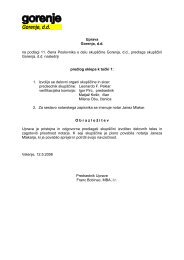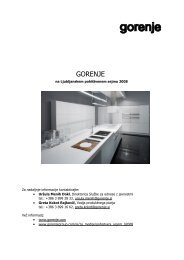ANNUAL REPORT 2008 - Gorenje Group
ANNUAL REPORT 2008 - Gorenje Group
ANNUAL REPORT 2008 - Gorenje Group
You also want an ePaper? Increase the reach of your titles
YUMPU automatically turns print PDFs into web optimized ePapers that Google loves.
150<br />
<strong>2008</strong><br />
Deferred tax is recognised using the balance sheet method, providing for temporary differences<br />
between the carrying amounts of assets and liabilities for financial reporting purposes and the<br />
amounts used for taxation purposes. Deferred tax is not recognised for the following temporary<br />
differences: the initial recognition of assets or liabilities in a transaction that is not a business combination<br />
and that affects neither accounting nor taxable profit, and differences relating to investments<br />
in subsidiaries and jointly controlled entities to the extent that it is probable that they will<br />
not reverse in the foreseeable future. In addition, deferred tax is not recognised for taxable temporary<br />
differences arising on the initial recognition of goodwill. Deferred tax is measured at the<br />
tax rates that are expected to be applied to the temporary differences when they reverse, based<br />
on the laws that have been enacted or substantively enacted by the reporting date. Deferred tax<br />
assets and liabilities are offset if there is a legally enforceable right to offset current tax liabilities<br />
and assets, and they relate to income taxes levied by the same tax authority on the same taxable<br />
entity, or on different tax entities, but they intend to settle current tax liabilities and assets on<br />
a net basis or their tax assets and liabilities will be realised simultaneously.<br />
A deferred tax asset is recognised to the extent that it is probable that future taxable profits will<br />
be available against which the temporary difference can be utilised. Deferred tax assets are reviewed<br />
at each reporting date and are reduced to the extent that it is no longer probable that the<br />
related tax benefit will be realised.<br />
( p ) E a r n i n g s p e r s h a r e<br />
The Company presents basic earnings per share (EPS) data for its ordinary shares and diluted earnings<br />
per share. Basic EPS is calculated by dividing the profit or loss attributable to ordinary shareholders<br />
by the weighted average number of ordinary shares outstanding during the period.<br />
(r) Comparative information<br />
Comparative information has been mainly harmonised with the presentation of information in the<br />
current year. Where required, adjustment of comparative data was carried out in order to comply<br />
with the presentation of information in the current year.<br />
(s) New standards and interpretations not yet adopted<br />
A number of new standards, amendments to standards and interpretations are not yet effective for<br />
the year ended 31 December <strong>2008</strong>, and have not been applied in preparing these financial statements:<br />
• IFRS 8 Operating Segments (effective as from 1 January 2009)<br />
introduces the “management approach” to segment reporting, which becomes<br />
mandatory for the financial statements for 2009.<br />
Since segment reporting is only presented in the consolidated financial statements,<br />
the standard shall have no impact on the Company’s financial statements.<br />
• Revised IAS 23 Borrowing Costs (effective as from 1 January 2009)<br />
removes the option to expense borrowing costs and requires that an entity capitalise<br />
borrowing costs directly attributable to the acquisition, construction or<br />
production of a qualifying asset as part of the cost of that asset.<br />
The revised IAS 23 will become mandatory for the Company’s 2009 financial<br />
statements and will constitute a change in accounting policy for the Company.<br />
In accordance with the transitional provisions the Company will apply the<br />
revised IAS 23 to qualifying assets for which capitalisation of borrowing costs<br />
commences on or after the effective date.<br />
• Amendments to IFRS 2 Share-based Payment (effective as from 1 January<br />
2009)<br />
The amendment clarifies the definition of vesting conditions and introduces the<br />
concept of non-vesting conditions. Non-vesting conditions are to be reflected<br />
in grant-date fair value and failure to meet non-vesting conditions will generally<br />
result in treatment as a cancellation.

















